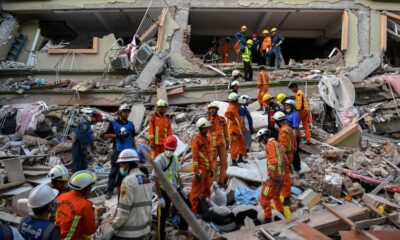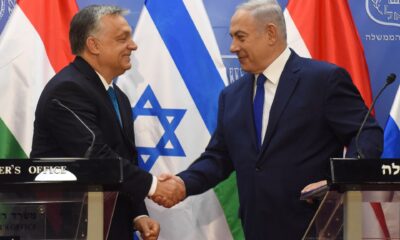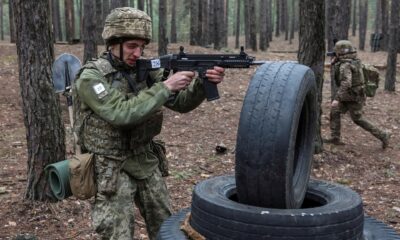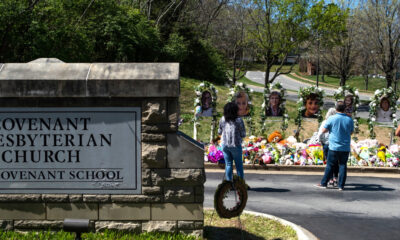Middle East
Meta profits as ads promote illegal Israeli settlements in West Bank | Israel-Palestine conflict News

Facebook has platformed more than 100 paid advertisements promoting illegal settlements and far-right settler activity in the occupied West Bank, an Al Jazeera investigation has found, raising concerns that the social media giant is profiting from content that may violate international law.
Among the advertisements identified were also calls for the demolition of Palestinian homes, schools, and playgrounds, as well as fundraising appeals for Israeli military units operating in Gaza.
Facebook’s parent company Meta told Al Jazeera that any advertisements that ran on its platforms were reviewed by the company. While it admitted that some of the advertisements had since been removed for “violating our social issues, elections, and politics policies”, it did not specify whether the promotion of illegal settlements built on stolen Palestinian land breached those standards.
Legal experts told Al Jazeera that Meta could be complicit in violations of international law by approving, accepting payment, and publishing these advertisements. Brian Leishman, an MP in the United Kingdom parliament, described the findings as “extremely concerning”.
Illegal settlements advertised on Facebook
At least 52 paid advertisements from Israeli real estate companies were found promoting property sales in settlements across the occupied West Bank, targeting buyers from across Israel as well as some users in the UK and the United States. These advertisements were first published in March 2024, and many remain active on Facebook.
“We have robust processes and teams to review ads, and our ad review system is designed to review ads before they go live,” Meta told Al Jazeera. “This system relies primarily on automated technology to apply our Advertising Standards to the millions of ads that run across our apps, while relying on our teams to build and train these systems, and in some cases, to manually review ads.”
Among the advertisements identified by Al Jazeera were at least four promoting property sales in the illegal Israeli settlement of Ariel, 20km (12 miles) east of the Green Line in the occupied West Bank. The listings, written in Hebrew and targeting Israeli Facebook users, were paid for by a Facebook page called “Ramat Aderet”, which describes itself as offering “penthouses for a perfect quality of life”.
According to the website, the Ramat Aderet (Hillside Crown) project is “two neighbourhoods – north and south – with a total of 27 … buildings of between 4 to 8 floors. The apartments provide a complete urban living experience in a perfect neighbourhood.” The company has a valuation of $300m, according to PitchBook, a research firm and financial data provider.
Ramat Aderet did not respond to Al Jazeera’s request for comment.

The real estate company selling apartments and houses in Ariel is Ram Aderet, which has received financing from the First International Bank of Israel.
The Boycott, Divestment, and Sanctions (BDS) movement has long called for a boycott of the bank over its role in financing illegal settlements. Following pressure, in January 2014, the Dutch pension fund PGGM withdrew investments from the bank, while insurance giant AXA divested in 2022.
Another 48 advertisements were posted by Gabai Real Estate, advertising homes in the occupied West Bank settlement of Ma’ale Adumim and the Efrat settlement.
These homes are part of an expansion approved in March 2024 by Israel’s “Higher Planning Committee”, which is overseen by far-right Finance Minister Bezalel Smotrich, who, since 2023, no longer needs political or military approvals for expansion plans.
Yaniv Gabbay, the co-owner of Gabai Real Estate, told Al Jazeera: “Unfortunately, we were only able to post 48 ads because our budget is limited, and we advertise on many different platforms. But as we sell more homes to Jews returning home to Judea, our advertising budget will increase, and we can post more.”
Some Israelis refer to the occupied West Bank as Judea and Samaria, and the far-right government has made a push towards annexing the Palestinian territory.
The advertisements attempt to portray living in the settlements as idyllic. One lists an eight-bedroom mansion with a “huge garden, large succah area (seats 50+), above-ground pool, Jacuzzi, sauna, cold plunge, and breathtaking desert mountain views… A dream home just 20 minutes from Jerusalem! Don’t miss out!”
Carolina Are, a platform governance researcher at the Centre for Digital Citizens at Northumbria University, told Al Jazeera that “the real estate ads have been expertly framed as standard property listings, allowing them to elude moderation”.
“Moderators may not be aware of the nuances of international law either,” she added.
Under international law, all Israeli settlements in the West Bank are illegal. The transfer of an occupying power’s civilian population into occupied territory is considered a war crime under the Rome Statute of the International Criminal Court.
Professor Aoife O’Donoghue, international law expert from Queen’s University Belfast, said: “On the West Bank, property can be privately bought and sold. However, whether they have the legal title to sell that land at all would be highly questionable.
“If the Israeli government is facilitating it, and they are settlements, then they would be in violation of the Third Geneva Convention. Here, the Israeli government has a duty to prevent illegal settlements.”

Settler groups pushing for demolitions
Al Jazeera also identified 50 advertisements posted by Regavim, a far-right settler group founded by Smotrich in 2006, that has called for the destruction of Palestinian homes, schools, and a children’s water park. The group receives funding from the Israeli government via the West Bank settlement councils, and also Amana, another pro-settlement organisation sanctioned by the UK and US governments.
One advertisement celebrated the demolition of a Palestinian school, boasting: “Following our petition, Civil Administration forces tore down an illegal Palestinian school built in the Herodian Nature Reserve… This school is only one out of more than 100 illegal school buildings.”
Another advertisement called for a Palestinian water park to be demolished, claiming: “Palestinians are enjoying themselves at our expense.”
Regavim defended the campaign against the school, saying it was “built for the sole purpose of creating confrontation”.
“[It] was deemed by the [Israeli] courts to pose a very serious and imminent danger to the safety and wellbeing of the Palestinian children who were being bussed in to fill the makeshift structure,” Naomi Linder Kahn of Regavim said.
The European Union has previously condemned the demolition of schools in the West Bank, and Human Rights Watch has described the practice as “discriminatory and violates children’s right to education”.
In October last year, nearly 90 US legislators urged then-President Joe Biden to impose sanctions on Regavim.
Regavim denies being a far-right or settler group, instead claiming to be a “mainstream, professional contributor to public discourse and is a frequent participant in national policy discussion and debate”.
But Leishman, the British MP, said: “Revelations that Israeli far-right pro-settler groups as well as businesses – and allegedly even active Israeli soldiers – may be using social media to promote what could be seen as illegal under international law are extremely concerning.”
Facebook fundraisers for Israeli soldiers in Gaza
Beyond settlement expansion, Meta has also platformed fundraising advertisements for Israeli military units operating in Gaza, even after a ceasefire was declared.
Legal experts say allowing such advertisements may violate international humanitarian law by promoting military operations in occupied territory.
Nine advertisements, paid for by Israeli singer Mayer Malik, sought donations for sniper teams, drone units, and special forces battalions deployed in Gaza. One advertisement, still active on Facebook, reads: “We urgently need shooting tripods to complete our mission in Jabalia.”

Other advertisements requested funding for drones for the Yasar Battalion and an elite Israeli army unit in Rafah, as well as night-vision goggles for the Golani Brigade.
Malik did not respond to two requests for comment from Al Jazeera.
According to Meta’s advertising guidelines, “Ads must not promote the sale or use of weapons, ammunition or explosives. This includes ads for weapon modification accessories.”
Professor Neve Gordon of Queen Mary University, UK, said: “Facebook is making money from criminal activity.
“By allowing third parties to post such ads, Facebook becomes complicit in their criminal activity, since the ads themselves play a role in whitewashing, normalising and legitimising acts that, according to international humanitarian law and the Rome Statute, are egregious crimes.”
Leishman added: “Social media giants should be a lot more careful about what they allow to appear on their platforms, rather than profiteering from organisations with a dangerous and divisive agenda.
“It is time for them to start taking responsibility so that they are not complicit in systematic violations of international law.
“Everyone is under an obligation not to recognise, aid or assist in maintaining the illegal occupation of Palestinian territory – social media giants are not exempt or above the law.”
Middle East
‘Just like that’: Yemeni families destroyed by US air strikes | Israel-Palestine conflict News

Sanaa, Yemen – On the evening of March 15, Ammar Mohammed* strolled through the vibrant streets of a modern residential neighbourhood in northern Sanaa.
The tall, slim man was nattily dressed and expecting a delicious meal at a relative’s home.
The pleasant spring air, cooled after sunset, carried the rich aromas of home-cooked dishes as families prepared to break their fast on the last day of Ramadan.
The two-storey house of his wife’s relatives, the al-Zeinis*, was lit up, as with the other tightly packed homes on that street.
Even from a distance, he could see rows of windows glowing warmly and felt the hum of life radiating from behind closed doors he walked past, as people chatted, children squealed, and cutlery clattered.
He was looking forward to iftar and to his wife joining him later at her relatives’ home for a post-iftar gathering.
The street was bustling – mosque speakers echoed Quranic recitations, children chased each other barefoot over the asphalt, and the clatter of bustling kitchens spilled from open doorways.
He was a stone’s throw away when the evening was split apart.

A deafening roar shattered the calm, a blinding orange flash turning everything into a terrifying artificial dawn.
The ground convulsed beneath him, and he was hurled backwards, ears ringing as a shockwave of dust and debris swept over him, stinging his skin. For a moment, he could not breathe.
When he lifted his head, the al-Zeini home was gone.
“Just like that, the house had collapsed into a smouldering heap of rubble and twisted metal,” the 30-year-old civil servant said.
“All 12 al-Zeinis – mostly women and kids – who were inside on a peaceful Ramadan evening, were killed,” he said in pain.
The al-Zeini family had been killed in a raid ordered by United States President Donald Trump.
Trump claimed he wanted to target Houthi fighters and military installations, to force them to stop attacking Israeli-linked ships in the Red Sea – which the Houthis say they are doing in response to Israel’s ongoing blockade of the Gaza Strip.
The US raids continued, and have killed at least 53 people, while nearly 100 others were wounded.
A neighbourhood shattered
Mohammed, palms bleeding from the force with which he was hurled onto the asphalt, raced to the house to see if there were any survivors.
The house had been demolished, along with the one right next to it.
He joined a crowd of neighbours pulling away bricks and iron rebar in search of people, to ultimately realise no one was alive.
“I was swept away by emotions and thoughts, just like my surroundings. I was confused, scared, grateful, alarmed, happy to have survived, and devastated by what happened to this family.
“This was a family breaking their fast together, not a military base. Americans make no distinction between a rebel and a child,” he told Al Jazeera.
He could not say anything further about his slain relatives, only saying he dreaded what would come next.
He vividly recalled how the joyful sounds of children playing were suddenly replaced by piercing screams as panicked parents rushed into the streets, desperately searching for their little ones.

‘They were there just a minute ago’
Like Khawla*, who was a few houses down from the al-Zeinis, setting the table and keeping an eye on her two sons, eight-year-old Usama and six-year-old Mustafa, playing outside.
They were awaiting their father’s return before the family could sit down to break their fast.
With the ground shaking and the explosive sound of the raid, the alarmed 30-year-old mother rushed outside in panic, looking for any trace of her little ones.
“My children were there moments ago, and suddenly I couldn’t see them,” she said.
“I staggered through the wreckage strewn across the street, the air was still full of dust. I was terrified.
“I screamed out their names … nothing,” she said, her voice cracking as she recalled that night.
“A neighbour spotted two small bodies flung several metres away by the blast’s force,” Khawla, who asked to be referred to by her first name only, said.

The neighbour scooped them into his arms and carried them into Khawla’s home, afraid that another attack might follow, and feeling it would be safer to be indoors.
“I chased after him, sobbing and trying to understand how badly my boys were hurt. They were too shocked to respond, but once inside, I frantically examined every inch of their bodies.”
Luckily, the boys’ injuries were limited to bruises and cuts all over their bodies, and she was able to tend to them herself.
“These are cuts that are curable, but there are scars too deep and much more difficult to fix. My kids haven’t been themselves since.”
The boys keep asking if more bombs will fall on the neighbourhood, she added.
“I hug them, avoid answering the question … but I can’t get over the sight of the household whose children didn’t make it.”
* Names changed for the individuals’ safety
This article was published in collaboration with Egab.
Middle East
Palestinian aid workers likely shot ‘execution style’, forensic expert says | Israel-Palestine conflict News

The Palestinian Red Crescent, which lost nine of its staff in the March 23 Israeli attack, called killings one of the war’s ‘darkest moments’.
New evidence suggests that some of the 15 Palestinian aid workers killed by Israeli forces in Rafah last week were shot at close range in what appeared to be execution-style killings – an attack the Palestine Red Crescent Society (PRCS) has described as “one of the darkest moments” of the war.
Forensic analyst Ahmad Dhaher, who personally examined five of the bodies at Khan Younis’s Nasser Hospital, said the evidence pointed to close-range gunfire.
“Preliminary analysis suggests they were executed, not from a distant range, since the locations of the bullet wounds were specific and intentional,” Dhaher told The Guardian newspaper.
“One observation is that the bullets were aimed at one person’s head, another at their heart and a third person had been shot with six or seven bullets in the torso.”
He cautioned that the state of decomposition made it difficult to draw definitive conclusions.
The aid workers disappeared on March 23 during a rescue mission in Rafah’s Tal as-Sultan neighbourhood after it came under attack by Israeli forces. The group included nine PRCS medics, six civil defence workers and one United Nations employee.
According to the UN Office for the Coordination of Humanitarian Affairs (OCHA), after the first rescue team was killed, other emergency crews searching for them were repeatedly struck over several hours.
A week later, 15 bodies were discovered buried in the sand, which OCHA described as a “mass grave.” One PRCS worker remains missing.
This is “one of the darkest moments in this conflict that has shaken our shared humanity to its core,” PRCS President Younes al-Khatib told the UN Security Council on Thursday.
Al-Khatib also said PRCS dispatchers overheard a conversation in Hebrew between Israeli forces and some of the aid workers, indicating that at least some were still alive while in Israeli custody.
Israel’s military claimed that nine Hamas and Islamic Jihad fighters were inside the rescue crews’ ambulances but said it was launching an investigation into the incident.
“The presence of those terrorists puts everyone’s lives at risk,” claimed Israel’s ambassador to the UN Danny Danon.
Humanitarian workers have been repeatedly targeted during the Gaza war, with 408 killed so far, including 280 UN staff, according to the UN.
UN High Commissioner for Human Rights Volker Turk said the aid workers’ killing raises “further concerns over the commission of war crimes by the Israeli military”.
Speaking at a UN Security Council meeting in New York, Turk called for an “independent, prompt and thorough investigation” into their killing.
“There is clearly growing consensus within the council that it must do more to hold Israel accountable,” reports Al Jazeera’s Gabriel Elizondo from the UN headquarters in New York.
Middle East
At least 16 killed as two refugee boats sink off Turkiye and Greece | Migration News

Greek and Turkish coastguards still searching for two missing people from the two unrelated accidents.
Two boats carrying refugees sank in the narrow stretch of sea between Turkiye and the Greek island of Lesbos, leaving at least 16 people dead, according to officials from both countries.
The accidents on the boats, which together carried about 66 people, occurred several hours apart on Thursday, with authorities on either side unaware of the other nation’s rescue efforts.
On the Greek side, the country’s coastguard said that one of its patrol boats came across a small dinghy of about five metres (5.5 yards) in length that was taking on water, and rescued 23 people – 11 minors, eight men and four women – out of a reported total of 31 passengers.
Authorities later recovered the bodies of seven people – three women, two boys, one girl and one man – after a search and rescue operation that included helicopters, vessels from the coastguard, and the FRONTEX European border agency.
The Greek coastguard said rescuers were still searching on Thursday evening for a young girl who had been reported as missing by survivors.
One of the survivors, identified only as a 20-year-old man, was arrested on suspicion of being a people smuggler after other passengers allegedly identified him as having piloted the dinghy, the coastguard said.
Separately in Turkiye, authorities from the northwestern province of Canakkale said the coastguard received an emergency call for help from a boat early Thursday morning, rescuing 25 people after deploying three boats and a helicopter.
The statement said that nine bodies had been recovered and the search for one missing person continued. Turkish media said the survivors were taken to a hospital in Turkiye.
Shipwrecks are very common on the short but perilous route between the Turkish coast and the nearby Greek islands of Samos, Rhodes and Lesbos that serve as entry points to the European Union for people fleeing conflict and poverty.
The Greek government has cracked down with increased patrols at sea, and many smuggling rings have shifted their operations south, using larger boats to transport people from the northern coast of Africa to southern Greece.
Last year, more than 54,000 people used what has become known as the eastern Mediterranean route heading to Greece, and more than 7,700 crossed Greece’s small land border with Turkiye, according to figures from the United Nations.
A total of 125 people were reported dead or missing.
-

 Africa1 day ago
Africa1 day agoUS president announces global tariffs, including on 51 African nations
-

 Asia2 days ago
Asia2 days agoMyanmar’s military government announces temporary ceasefire to aid quake efforts
-

 Europe2 days ago
Europe2 days agoLive updates: Trump announces sweeping new tariffs on imports on ‘Liberation Day’
-

 Middle East2 days ago
Middle East2 days agoIsrael’s Netanyahu heads to Hungary in defiance of ICC arrest warrant | Gaza News
-

 Conflict Zones1 day ago
Conflict Zones1 day agoRussia-Ukraine war: List of key events, day 1,134 | Russia-Ukraine war News
-

 Education2 days ago
Education2 days agoA trans teacher in Texas resigns after being targeted by conservatives online
-

 Sports2 days ago
Sports2 days agoDaria Kasatkina: Russian-born tennis player ‘didn’t have much choice’ over switching allegiances to Australia
-

 Education2 days ago
Education2 days agoNashville school shooter sought fame in 2023 attack that left 6 dead, report finds



